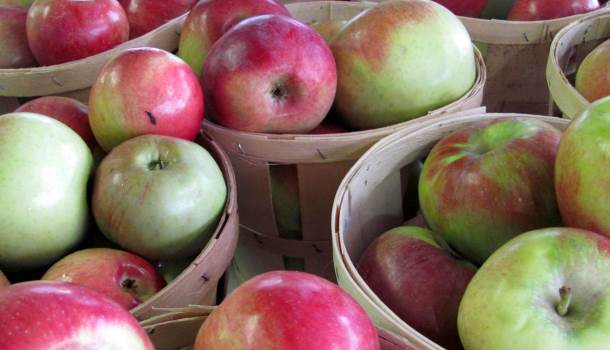September 29, 2020
What producers and consumers should know about COVID-19 and food safety
By: Chris Laughton

Among the issues facing producers, particularly those involved in direct marketing or the sale of fresh produce, are consumers’ food safety concerns related to COVID-19. Understandably, many people are concerned about how to keep themselves and their families safe and have been well informed about how the virus is transmitted. Yet, just as important is how the virus is not transmitted. Here are some details on food safety in the current environment that may help calm your uncertainty.
Food safety during COVID-19
COVID-19 is not a foodborne illness. It is a respiratory illness that spreads primarily from person-to-person via close contact with infected individuals. There is a much lower possibility that a person can get COVID-19 by touching a surface or object that has the virus on it and then touching their own mouth or nose, as this is not believed to be the main way the virus spreads.1 In addition, there is no current evidence of food or food packaging being associated with transmission of COVID-19.
Unlike foodborne gastrointestinal (GI) viruses and bacteria like E. coli and Hepatitis A that may make people ill through contaminated food, SARS-CoV-2, which causes COVID-19, is a virus that causes respiratory illness and not gastrointestinal illness. Foodborne exposure to this virus is not known to be a route of transmission.2
Standard cooking temperatures will kill common viruses and bacteria, including the virus that causes COVID-19. Regarding fresh fruits, vegetables and leafy greens that will be consumed raw, current USDA guidance is to rinse them under cold running water to remove lingering dirt and contaminants.3
Human health precautions
There have been some well-publicized reports of COVID-19 outbreaks on farms and food processing facilities, such as meatpackers, earlier this year. Farm and food worker safety amidst the outbreak is indeed a major concern that producers are taking seriously, but the focus of these headlines was a concern for worker safety, not food safety.
That said, person-to-person contact is the most frequent way COVID-19 can spread. For example, protecting yourself from person-to-person transmission of the virus while shopping, rather than worrying about the food itself, should be the priority in a public environment. Wearing a mask, maintaining distance between yourself and others, and frequent handwashing are your best defenses.
Food, including fresh produce, remains safe to consume, so don’t go overboard in your attempt to protect yourself or your loved ones! Instead, arm yourself with the following practices recommended by food safety experts:
- DO NOT stop eating fresh fruits and vegetables. They provide considerable nutritional benefits that help maintain personal health and hence enhance the ability to fight off infections
- DO NOT wash your fruits and vegetables in soap, sanitizer, disinfectant, acid or any other chemical.
- DO NOT mix different sanitizers, disinfectants, acids or other chemicals, as their inappropriate use can create other health hazards.4
- DO NOT wash produce in sinks or with utensils that may have been exposed to raw products (e.g., raw eggs, raw meat), as this can lead to cross contamination with microbes that can cause foodborne illness (such as Salmonella).5
Consuming fruits and vegetables remains safe during this pandemic, and a healthy, varied diet is important for maintaining a robust immune system. Visit the Centers for Disease Control and Prevention website, CDC.gov/foodsafety, for more information.
1 CDC.gov, https://www.cdc.gov/coronavirus/2019-ncov/prevent-getting-sick/how-covid-spreads.html
2 FDA.gov, https://www.fda.gov/emergency-preparedness-and-response/coronavirus-disease-2019-covid-19/covid-19-frequently-asked-questions
3 Cornell University food safety, https://instituteforfoodsafety.cornell.edu/coronavirus-covid-19/food-safety-recommendation-consumer/consumer-faqs/#hot-vs-cold-foods
4 CDC.gov, https://www.cdc.gov/mmwr/volumes/69/wr/mm6916e1.htm
5 Cornell University food safety, https://instituteforfoodsafety.cornell.edu/coronavirus-covid-19/food-safety-recommendation-consumer/consumer-faqs/#fresh-open-veggies




